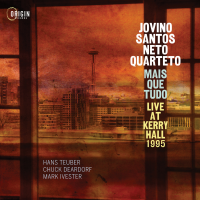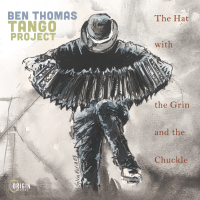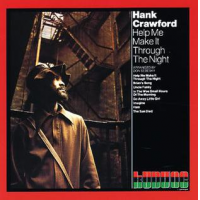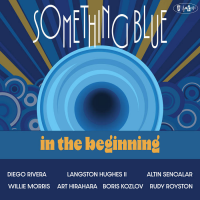Home » Jazz Articles » Liner Notes » Reeds and Deeds: Cookin'
Reeds and Deeds: Cookin'

Eric Alexander
saxophone, tenorb.1968

One for All
band / ensemble / orchestrab.1997
So with the credentials of our two leading men well defined, it might be interesting to ponder the lineage of the quintet's moniker and the titles of their two discs. For starters, Reeds and Deeds also names a 1963 album on Mercury Records by multi-instrumentalist Roland Kirk, a recording that just so happens to feature pianist

Harold Mabern
piano1936 - 2019

Sonny Stitt
saxophone1924 - 1982

Gene Ammons
saxophone, tenor1925 - 1974

Johnny Griffin
saxophone, tenor1928 - 2008
Now while this modest lesson suggests that these guys have done their homework, it should not be considered a foregone conclusion that the group is simply rehashing previous glories or engaging in the kind of cutting contests that were so popular in the '50s. Nothing could be farther from the truth, as Alexander and Stewart have fashioned a collaborative ensemble that benefits strongly from the combined efforts and varied experiences of our front line partners.
"I think our styles are so different that it's not as much of a cutting session as it could be," explains Stewart. "Eric definitely raises the bar pretty high and we're definitely trying to push one another to play better. We're coming out of some of the same people more or less, but we think differently. [Still,] there are enough similarities that we get a cohesive sound, but we're different enough that it's still interesting." As for Alexander, while the camaraderie is an obvious factor in making this kind of situation musically stimulating, he also admits to some healthy rivalry. "When you're going head to head," Eric affirms, "you've really got to jump all over the tunes or else you sound like you're getting blown away by the other cat."
Returning from the group's first effort is pianist

David Hazeltine
pianob.1958
Another lock tight rhythm team steps up to spell

Peter Washington
bassb.1964

Kenny Washington
drumsb.1958
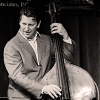
John Webber
bass, acoustic
Joe Farnsworth
drumsb.1968

Jimmy Cobb
drums1929 - 2020

Michael Weiss
pianob.1958
Although the program here does not include any originals, Alexander and Stewart have managed to dig deep for an agreeable selection that includes bossa nova, quicksilver bebop, the blues lexicon, and a ballad feature for both tenor men. Each number goes for a particular feel and utilizes the two horns in a way that most complements the melody. The pair approaches unison passages with an especially well-developed precision, the technical proficiency needed to accomplish such a feat not to be taken for granted. Like the ideal club set, much thought has been given to the pacing and flow of each track with plenty of blowing space for Stewart, Alexander, and Hazeltine to boot.
Not as well known as his other signature numbers, "Conception" and "Lullabye of Broadway," George Shearing's "She" is seldom performed these days but is destined to be picked up now that Stewart and Alexander have revisited this beguiling composition. "I discovered that tune one night after a gig at Fat Cat," explains Stewart. "Pianist Sacha Perry showed that to me and

Joe Cohn
guitarTight unison passages and a brisk tempo help make "So in Love" a lesson in survival of the fittest. Grant is up first again, cleverly utilizing the tune's melody as a springboard for his mercurial statement. Eric then comes on strong, eating up the changes and utilizing the full range of his horn in a way that has always set him apart from his peers.
"I've always wanted to record this beautiful tune, " says Alexander of "Never Let Me Go." While he sticks to the ballad tempo at first, his ideas start flowing in such a way that in order to allow them unfettered development he jumps into double time for much of his solo statement. Hazeltine then gets a turn before Eric's return, a closing gambit that further illuminates the saxophonist's considerable maturity and confidence.
Several years before the smooth tenor of

Stan Getz
saxophone, tenor1927 - 1991

Walter Wanderley
organ, Hammond B31932 - 1986

Antonio Carlos Jobim
piano1927 - 1994

Luiz Bonfa
guitar, acoustic1922 - 2001
Saxophonist

Gene Ammons
saxophone, tenor1925 - 1974
Grant's ballad feature, "Trouble is a Man," is a lovely Alec Wilder piece that reminds us of the unique melodic gifts of this oft-neglected composer. As Stewart explains, "That's on At Ease with Coleman Hawkins, one of my favorite Hawk records. There's [also] a video of

Carmen McRae
vocals1920 - 1994
"Who Can I Turn To" comes from the collaborative team of Anthony Newley and Leslie Bricusse, penned for the 1965 musical The Roar of the Greasepaint, The Smell of the Crowd. Commenting on the sagacious idea to take this one at a quicker pace than usual, Eric acknowledges, "I like taking tunes that are generally done as ballads and swinging them." Agreeable to this arrangement, Grant says, "I used to play it quite a bit, but hadn't played it in awhile. I used to do it in E flat, but we do it [here] in F."
One of the many

Charlie Parker
saxophone, alto1920 - 1955
The obvious merits of their first effort notwithstanding, I think both Eric and Grant would have to agree that further time spent on the bandstand after the release of Wailin' has helped to make this sophomore effort an even stronger statement. Throughout the session, you can hear that the pots were on, with the pair cookin' up a most fortifying musical feast.
Liner Notes copyright ? 2025 C. Andrew Hovan.
Cookin' can be purchased here.
Contact C. Andrew Hovan at All About Jazz.
An avid audiophile and music collector, Chris Hovan is a Cleveland-based writer / photographer / musician.
Track Listing
She; So In Love; Never Let Me Go; Black Orpheus; Hittin' The Jug; Trouble Is A Man; Who Can I Turn To; Passport.
Personnel
Eric Alexander
saxophone, tenorGrant Stewart
saxophone, tenorDavid Hazeltine
pianoJohn Webber
bass, acousticJoe Farnsworth
drumsAlbum information
Title: Cookin' | Year Released: 2006 | Record Label: Criss Cross
Tags
Comments
PREVIOUS / NEXT
Support All About Jazz
 All About Jazz has been a pillar of jazz since 1995, championing it as an art form and, more importantly, supporting the musicians who make it. Our enduring commitment has made "AAJ" one of the most culturally important websites of its kind, read by hundreds of thousands of fans, musicians and industry figures every month.
All About Jazz has been a pillar of jazz since 1995, championing it as an art form and, more importantly, supporting the musicians who make it. Our enduring commitment has made "AAJ" one of the most culturally important websites of its kind, read by hundreds of thousands of fans, musicians and industry figures every month.
Go Ad Free!
To maintain our platform while developing new means to foster jazz discovery and connectivity, we need your help. You can become a sustaining member for as little as $20 and in return, we'll immediately hide those pesky ads plus provide access to future articles for a full year. This winning combination vastly improves your AAJ experience and allow us to vigorously build on the pioneering work we first started in 1995. So enjoy an ad-free AAJ experience and help us remain a positive beacon for jazz by making a donation today.

New York City
Concert Guide | Venue Guide | Local Businesses
| More...







 Buy Now
Buy Now





